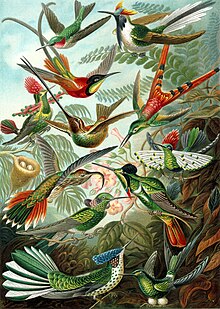What does spoken (Brazilian) Portuguese sound like? - part 2
Friday, July 11, 2008

Ilustração de vários colibris, retirada do livro - Illustration of various hummingbirds, taken from a book
Yesterday I put up a post with the Brazilian late Brazilian sociologist Herbert Jose "Betinho" de Souza giving a small speech, which is a perfect introduction to anyone that wants to know what spoken Portuguese sounds like and with a text below as well to reference. Today on Auxlang Antonielly Garcia Rodrigues was kind enough to write out the content of another short video by the same person, so I'm putting that up here as well. Actually it's a good thing he did because I thought that beija-flor was a type of flower when it really means hummingbird. I was wondering how a flower was able to go back and forth from the river. This video is a parable about doing one's part, how the effort of even the smallest person can change things for the better. Here's the video:
Then the transcript in Portuguese:
Há muito tempo atrás, uma floresta cheia de árvores, pássaros e floresThen for those curious about how close Portuguese and Spanish are, here it is translated automatically into Spanish with a bit of touching up by me (but probably still awkward):
começou a pegar fogo.
Os animais corriam, tratando de salvar sua própria pele. Foi aí que um
leão parou, ao ver que um beija-flor pegava a água do rio, jogava no
fogo e voltava pro rio.
- Ah, beija-flor! Você acha que sozinho vai apagar esse fogaréu todo?
- dizia o leão.
E o beija-flor respondeu:
- Sei que não posso apagar esse fogo sozinho. Estou apenas fazendo a
minha parte.
Durante mucho tiempo atrás, un bosque lleno de árboles, pájaros y floresThen in English:
comenzó a inflamarse.
Los animales corrían, tratando de salvar su propia piel. Fue allí que un
león se detuvo, al ver que un picaflor agarraba agua del río, jugaba al fuego y volvía al rio.
-- Ah, picoflor! ¿Cree usted que solo va a borrar todos los incendios?
-- Dijo el león.
Y el picaflor contestó:
-- Sé que no puedo borrar el fuego por sí solo. Estoy haciendo el
mi parte.
And finally in Interlingua. I don't see the word for hummingbird anywhere there, but at least three languages (Italian, French and Portuguese) use colibri so I'm going with that.A long time ago, a forest full of trees, birds and flowers began to catch fire.
The animals ran, trying to save their own skin. It was there that a lion stopped, to see that a hummingbird took the water of the river, threw it in the fire and returned to the river.
-- Ah, hummingbird! Do you think that you alone will put all the fire out?
-- Said the lion.
And the hummingbird replied:
-- I know that I can not put out the fire alone. I'm just doing my part.
Ante multe tempore, un foreste plen de arbores, aves e flores comenciava prender foco.
Le animales curreva, tentante salvar lor proprie pelle. Esseva ibi que un leon stoppava, a vider que un colibri prendeva le aqua del riviera, jectava lo al foco e retornava al riviera.
- Ah, colibra! Pensa tu que sol tu extinguera tote iste foco?
- diceva le leon.
E le colibri respondeva:
- Io sape que io non pote extinguer iste foco sol. Io sol es facente mi parte.





1 comments:
"I don't see the word for hummingbird anywhere there, but at least three languages (Italian, French and Portuguese) use colibri so I'm going with that."
And you're indeed right!
Post a Comment